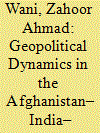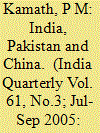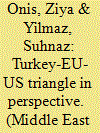| Srl | Item |
| 1 |
ID:
022579


|
|
|
|
|
| Publication |
2002.
|
| Description |
18-42
|
|
|
|
|
|
|
|
|
|
|
|
|
|
|
|
| 2 |
ID:
188813


|
|
|
|
|
| Summary/Abstract |
Since the partition of the subcontinent in 1947, the geopolitics of South Asia has been shaped by a dynamic triangular relationship among Afghanistan, India and Pakistan on which depend prospects of peace, governance and stability in the South Asian region. This article examines how and why the Afghanistan–India–Pakistan triangle emerged and how it affects the entire South Asian region as a matter of geopolitics. The article also analyses why major strategic and political shifts occurred in these complex relations after the fall of the Taliban rule in Afghanistan in 2001 and ventures to provide some comments on more recent developments. The evolution and nature of the triangular engagements lie in the overlapping policies of these three countries. Hence, I identify their interactions as constituting a dynamic triangle. This article argues that strategic positioning and concerns and claims for political space have shaped their relationship to such an extent that if something bad happens in one of the three countries, this affects the position of the other two as well. That is why the current re-alignments in Afghanistan have crucial implications for the whole region, not just in terms of their respective foreign policy objectives but also for the long-term harmony, peace, progress and stability in the whole region.
|
|
|
|
|
|
|
|
|
|
|
|
|
|
|
|
| 3 |
ID:
077407


|
|
|
|
|
| Publication |
2007.
|
| Summary/Abstract |
Europe is neither in the centre of Southeast Asia's nor of Northeast Asia's strategic interest. For both, Asians and Europeans it has been equally difficult to articulate their visions of each other's role in security matters. However, Asia recognizes positively the EU's civilian dominated approach in peacekeeping missions, e.g. in East Timor or in Aceh. Europe's contribution to the Asia Regional Forum has been rather modest. But due to the increasing importance of comprehensive security, Europe's experiences as a soft power could well change this position, provided both sides pay more attention to the constraints of the two regions. China as the major power in the region is somehow caught between the devil and the deep blue sea: on one side, it neither wants nor expects Europe to play a strategic role in East Asia. On the other, it would like to see Europe to become a power of its own in a China-US-EU triangle.
|
|
|
|
|
|
|
|
|
|
|
|
|
|
|
|
| 4 |
ID:
148059


|
|
|
|
|
| Summary/Abstract |
This paper examines the evolving geopolitical developments in the Indo-Pacific region, especially through the lens of an India–US–China trilateral/tripolar framework. At a time when ‘strategic unease’ has become a defining characteristic of the region and ‘security alignments and strategic hedging’ a prevalent diplomatic tendency, this paper captures an evolving trend of convergence in the strategic visions of the three key Indo-Pacific players – India, China and the US, and rising bilateral strategic/defence cooperation between them. Using a constructivist approach, this paper explores the feasibility of a trilateral cooperative framework among the three countries in near future.
|
|
|
|
|
|
|
|
|
|
|
|
|
|
|
|
| 5 |
ID:
066509


|
|
|
| 6 |
ID:
021712


|
|
|
|
|
| Publication |
Jan-March 2002.
|
| Description |
25-132
|
|
|
|
|
|
|
|
|
|
|
|
|
|
|
|
| 7 |
ID:
057034


|
|
|
| 8 |
ID:
013289


|
|
|
|
|
| Publication |
Dec 1997.
|
| Description |
1-14
|
|
|
|
|
|
|
|
|
|
|
|
|
|
|
|
| 9 |
ID:
077758


|
|
|
| 10 |
ID:
061704


|
|
|
|
|
| Publication |
Spring 2005.
|
| Summary/Abstract |
This article examines the delicate dynamics of the triangle of Turkey-EU-US relations. While acknowledging the role of the United States in promoting close links between Turkey and the EU, this study underlines the limits of American influence on EU decision-making on issues concerning “deep integration.” In this context, the future of this triangular relation depends on the interplay of contending forces in Turkey’s domestic political arena as well as the dynamics of trans-Atlantic relations in the international scene.
|
|
|
|
|
|
|
|
|
|
|
|
|
|
|
|
| 11 |
ID:
082852


|
|
|
|
|
| Publication |
2008.
|
| Summary/Abstract |
One of the most important foreign policy events of the year 2007 was RF President Vladimir Putin's February speech at the Munich Conference, signifying a unique turning point in Russia's relations with the West. ... The Russian leader's sharp criticism of the United States for its uncontrolled use of force in international affairs, and for its "unilateral, illegal actions" leading to the outbreak of wars and minor conflicts, had such a powerful and wide international response that all other events, dates, and facts that, under different circumstances would really deserve being recalled, were pushed into the background
|
|
|
|
|
|
|
|
|
|
|
|
|
|
|
|
| 12 |
ID:
059207


|
|
|